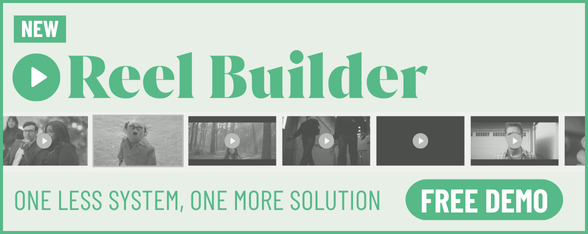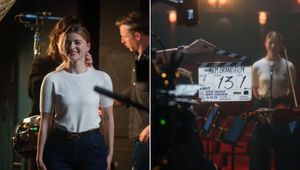
Beyond the Brief: Transforming Disability Inclusion in the Creative Industry

As the UK government pushes forward with controversial welfare reforms that could cut Personal Independence Payments (PIP) for up to 1.2 million disabled individuals, the need for systemic change in employment opportunities has never been more urgent. With disabled people already facing a staggering 28.6% employment gap, and only 23% of employers providing necessary workplace adjustments, the creative industry must confront its role in fostering genuine inclusion.
Enter Beyond the Brief – an initiative launched by With Not For to break down barriers and create sustainable employment for disabled talent within the creative sector. More than just a diversity initiative, Beyond the Brief is a call to action for agencies to move beyond surface-level representation and embed accessibility, inclusion, and authentic storytelling into the core of their work.
Through accessibility training, authentic representation workshops, and workplace inclusion support, Beyond the Brief aims to shift perceptions and dismantle misconceptions – such as the damaging belief that disabled professionals are less productive, held by 32% of the public. By working directly with disabled creatives, the initiative challenges outdated narratives and demonstrates the vast potential of a more inclusive industry.
To understand the driving force behind Beyond the Brief, its impact, and the changes it seeks to inspire, LBB’s Olivia spoke with With Not For co-founders Kelly Gordon and Emma Gardner to discuss the motivations behind the initiative, the urgent need for industry-wide commitment, and the structural changes required to ensure meaningful, long-term inclusion for disabled professionals.
LBB> What motivated With Not For to launch the Beyond the Brief initiative, and what specific challenges in disability employment is it addressing?
Kelly> Emma and I started With Not For with the goal of changing representation within advertising and media by creating more opportunities for disabled talent to be part of the creative process. The only way this works is if agencies and clients are open to education and reflection on their own perceptions of disability and therefore the stories they want to tell.
Stories about disability are often crafted through the lens of non-disabled creatives with preconceptions about what it means to be a disabled person within society. This leads to (unintentional or not) feeding into harmful narratives and perpetuates outdated stereotypes and tropes. Something we say the most at With Not For is “diverse and untold disabled stories already exist, so why try to create them?”
Allowing disabled talent into the creative process and working WITH us, ensures authentic representation and gives us the chance to tell our own stories. This is how Beyond the Brief was born. We want to work with ten agencies that are looking to make real change, not only to the narrative and the way disabled people are treated within society but also to the way disabled people are employed and compensated. Joining Beyond the Brief ensures that our partner agencies are actively paying and working with disabled talent at every stage of their programme, allowing for fresh perspectives, creative storytelling and incredible project teams.
Our training modules and services offered will better equip agencies and their clients to advance disability inclusion in their workplace, challenging them to learn how to embrace disabled talent and their stories across EVERY brief, not just disability focused projects.
LBB> How did recent government reforms and statistics on disability employment influence the timing and urgency of this initiative?
Emma> Beyond the Brief was already in the works to launch in 2025, however it is evident that with the anti-DEI rhetoric coming from the States and the recent changes to Personal Independent Payments (PIP) and benefits here in the UK, that this work is needed now more than ever.
On average, disabled households need an additional £1,010 a month to have the same standard of living as non-disabled households and the lack of understanding from the government about how cuts to PIP will affect disabled people is both deeply concerning and incredibly damaging.
Kelly> Work doesn’t always look the same for disabled people and many have to mask daily to ensure that we can retain employment or be selected for new opportunities. It is damaging and it is exhausting. Our aim is for Beyond the Brief to provide employment opportunities for disabled people at a critical time, whilst supporting workplaces to be inclusive and accessible in the process. Of course this won’t solve the whole issue, but it’s a start and one that shows allies and advocates how to support disabled talent in their workplaces right now.
LBB> What are the primary goals of Beyond the Brief, and what long-term impact do you hope to achieve within the creative industry?
Kelly> It sounds like a big goal to change the world, but we really mean that. A huge part of the way disabled people are viewed within society comes from what we see on our screens. disabled people are so often viewed as singular characters rather than multifaceted humans.
For example, we can be viewed as ‘inspirational’ for going out alone, we can be seen as Paralympians and superhuman, we can be viewed as people that have difficulties and challenges and we can also be viewed as benefit cheats and untrustworthy people. The fact that DWP reported 0% fraud in PIP benefits last year doesn’t come into it and won’t improve perception whilst lazy tropes continue to be broadcast.
Disability is a huge and diverse sliding scale that is much more nuanced and dynamic, innovative and unexpected. But the problem is that we rarely, if ever, see these stories on a mass scale. This ultimately means that broadly as a society we have no idea how to interact with disabled people naturally and appropriately, let alone employ them and provide psychological safety within the workplace. Our goal is to change that.
LBB> How did With Not For identify and collaborate with partners to support the initiative, and what role will they play in its execution?
Kelly> Our current partners have been selected by first approaching those who we know are doing great work and those that we are aligned with in terms of our goals for the future.
We are now looking to bring in other partners that we might not have worked with at present but that are aligned with our vision. Their role is paramount in the success of this campaign but also for the future of advertising.
We need real commitment not lip service or box ticking and we need partners to be open when it comes to doing this important work to start questioning and evolving their systems and processes. We don't have to throw out the rule book but it’s time to write new chapters with and not for the community.

LBB> What metrics or benchmarks will you use to measure the success of Beyond the Brief in creating sustainable employment opportunities?
Emma> First and foremost, a robust review and feedback process for the pilot session is key to ensure that we are also learning and iterating in line with our partners.
As part of our remit, we will be providing frameworks for each partner to track their behaviours within agency processes, that are designed to support them to question and identify ways to include disabled talent outside of the programme.
At the end of the programme we are inviting each partner to share the different ways they’ve worked with us over the course of the year, what talent they collaborated with and how effective that was at a celebratory wrap up event. We want this to act as an anti-gatekeeping way of getting the industry to support and learn from each other in how to become more inclusive and progressive in action and implementation.
And lastly, With Not For exists to facilitate and track creative employment opportunities for disabled talent. We measure our reach and impact responsibly brief by brief which led to the creation of Beyond the Brief as another way to deliver that. The goal is to enhance this blueprint to run year on year as we expand and reach more partners in the future.
LBB> What were the biggest challenges in implementing this initiative, and how did you navigate them to ensure its effectiveness?
Emma> The biggest challenges for us are rooted in the removal and deprioritisation of DEI in workplaces in the current political climate. As a business that exclusively represents disabled talent, by design we naturally fall into the DEI landscape and often budgets to secure our work sit in such pots that have been drastically reduced or in some cases removed.
However, at heart, we are a talent and production business that can sit on any creative supplier roster and we work hard to be seen and acknowledged as such. As disability inclusion is still so far behind, we provide training and education to ensure our talent feels safe and can be included, which often keeps the perception of us as a partner for ‘awareness months’ or calendar based activity.
We are slowly but surely changing that perception with brilliant partners we’ve worked with so far such as VCCP, Verve, RMA, FCB and Ogilvy to name a few. This was another reason for creating Beyond the Brief, to showcase the breadth of the work we do and the talent we can introduce. DEI has never been about initiatives for us, it’s about evolving and cementing inclusive culture within the fabric of businesses, and if we can do that as a disability founded and representative creative supplier whilst securing work for the community, then let’s go.
LBB> From your perspective, what are the most significant barriers to disability employment in the creative industry, and what structural changes are needed to improve accessibility and inclusion?
Kelly> The first barrier is again, perception. I would say that there is a belief that disabled talent doesn’t exist, or that the talent is more junior and less established which is really dangerous and often means that disabled talent doesn’t get seriously considered, or that the involvement of disabled people is often tied to an DEI initiative, rather than a job.
Secondly I think the way that we look at work as a whole and the assumptions that are applied to disabled people needs to be addressed. We work with a lot of creatives that have masked for their entire careers as they felt that workplaces weren’t equipped to deal with the conversations they needed to have, or that they would be treated differently if they disclosed. If we aren’t having these conversations and making tangible changes to the way we all work then things will never change.
Something that is often forgotten is that flexible ways of working and regular, good communication improves the work environment for us all, not just disabled people. No one should have to hide or mask who they are to be successful and have the careers that they desire.












.jpeg)
